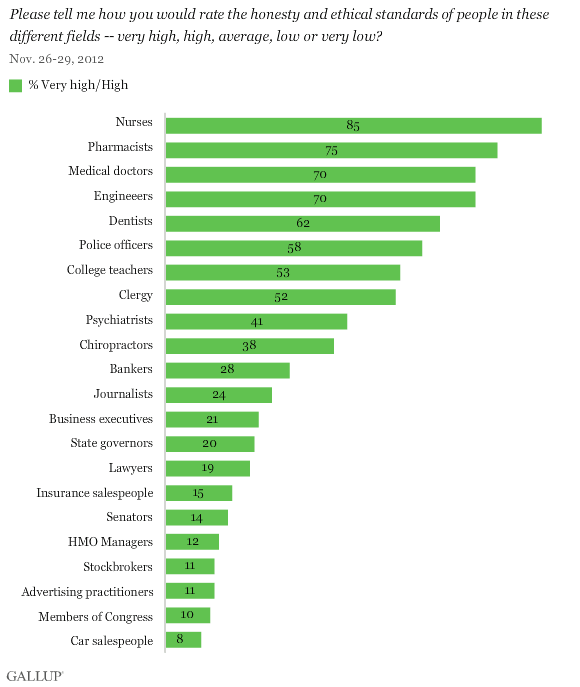This Blog has been featured by the West Orange Chamber of Commerce. Sources such as HLN have also been home to publications by Dr. Farnaz Namin-Hedayati and she has been cited by the Orlando Business Journal.
Management Monday: Managing Deception Detection Skills
Business life is stressful enough without having to worry about deceitful people. But as this GALLUP survey chart suggests, not every person or industry is known for honesty.
GALLUP Survey Results:

Furthermore, from big business deals to daily employee decisions, dishonest behavior can have a big impact on the bottom-line. In fact, Business News Daily Contributor, Chad Brooks, explains “A study of 23 large retail companies by loss-prevention consulting firm Jack L. Hayes International shows that 71,095 dishonest employees were apprehended in 2012, up 5.5 percent from 2011. In total, more than $50 million was recovered in those cases, up 7 percent from a year earlier.” From misrepresentation of hours worked on the time card to simply “painting a picture in pastel, rather than charcoal” to avoid conflict, dishonesty infiltrates most businesses on a daily basis.
 There’s no denying it would be nice if each lie made a perpetrator’s nose grow bigger, like Pinocchio. But that’s just not how it works. If it were, the public would have known Lance Armstrong was using steroids much sooner. Surprisingly, some of the most effective leaders in the workforce struggle with recognizing lies, likely due to high levels of emotional intelligence. In a study conducted by Alysha Baker at the Centre for the Advancement of Psychological Science and Law, there was a paradoxical finding that participants who scored higher on the “emotionality” component of emotional intelligence were significantly less accurate in spotting fakers. The participants with higher emotional intelligence also sympathized more with the people who lied, suggesting their heightened emotional state and empathetic nature caused them to misinterpret the deceptive cues.
There’s no denying it would be nice if each lie made a perpetrator’s nose grow bigger, like Pinocchio. But that’s just not how it works. If it were, the public would have known Lance Armstrong was using steroids much sooner. Surprisingly, some of the most effective leaders in the workforce struggle with recognizing lies, likely due to high levels of emotional intelligence. In a study conducted by Alysha Baker at the Centre for the Advancement of Psychological Science and Law, there was a paradoxical finding that participants who scored higher on the “emotionality” component of emotional intelligence were significantly less accurate in spotting fakers. The participants with higher emotional intelligence also sympathized more with the people who lied, suggesting their heightened emotional state and empathetic nature caused them to misinterpret the deceptive cues.
Whether a high score on the EQ assessment or not, everyone is capable of improving their deception detection skills. Remember, it isn’t healthy to assume everyone is a liar. This leads to isolation and lack of trust, which hinders healthy work culture. However, it isn’t a bad idea to be aware of deception indicators, as it could save a lot of time and money in the long run.
Lie Indicators:
The individual is sweating or fidgeting
Touching of face is sometimes an indicator of deceit
Inability to provide details in a story
Failure to make eye contact
Eyebrows drawn upward toward middle of forehead
Dilated Pupils
Rise in vocal pitch
Defensive tone
Use of “trust me,” “honestly,” and “to be honest” phrases
Most everyone hopes to be honest and genuine as a part of their moral values. But even for the most pure of heart, slip-ups happen. Recently, Fox News reported people are less likely to tell the truth as the day goes on, according to a Harvard study. Give people the benefit of the doubt, but remember the tips above. Detecting a fibber could save dollars.
Related Reads:
Strong Arm, Ethical Weakness
Reporting Co-Workers Prevents a Drinking Pilot?
(Tips cited from Forbes, Center for Work Life and WikiHow)





